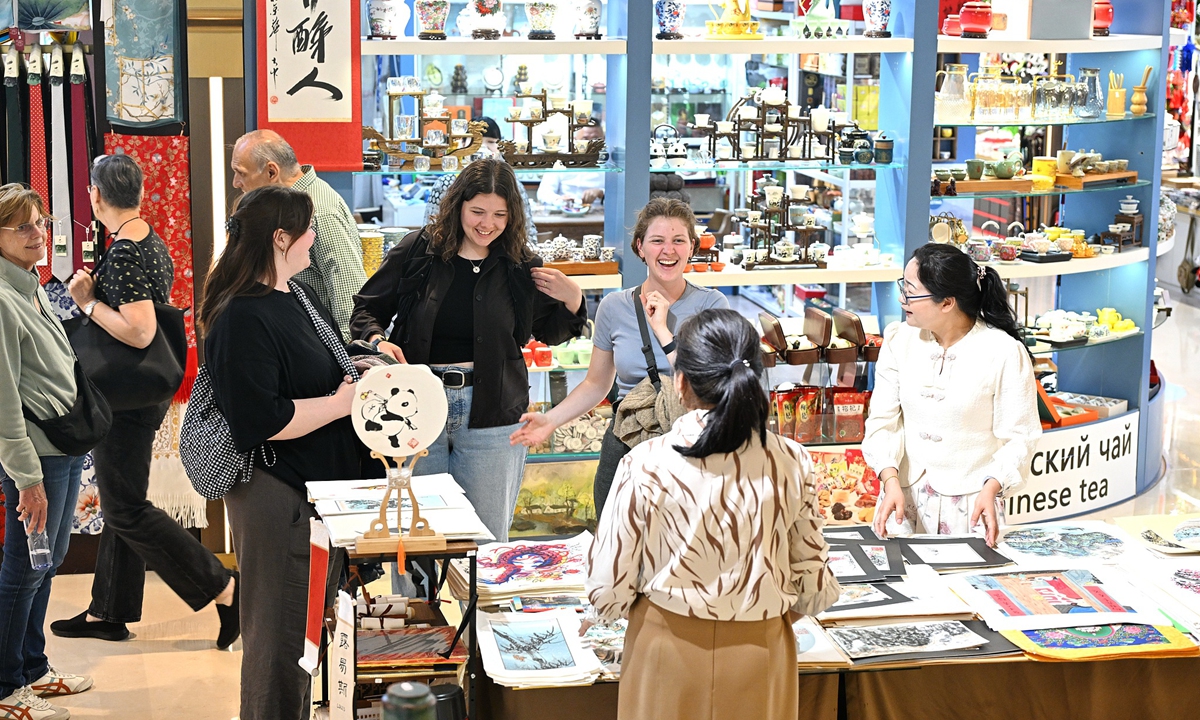China lowers threshold for tax refund for foreign visitors
Move to elevate tourist's experience, support inbound consumption growth

Foreign tourists shop at the Silk Street Market in Beijing on April 20, 2025. Photo:VCG
China unveiled a set of measures on Sunday to further optimize its departure tax refund policy to better meet overseas tourists' needs and expand inbound consumption. Chinese observers and industry participants said the continued opening up move will elevate China's standing as a global tourist destination and contribute to domestic consumption by giving foreign tourists more benefits.
The minimum purchase threshold for departure tax refunds has been lowered, allowing overseas travelers to apply for a refund if they spend at least 200 yuan ($27.75) at the same store on the same day and meet other relevant requirements, according to a circular jointly issued by the Ministry of Commerce and five other government departments, according to Xinhua News Agency.
Refunds will be made available through multiple channels, including mobile payments, bank cards and cash, to better accommodate the diverse payment preferences of overseas travelers. The upper limit for cash refund has been drastically raised from 10,000 yuan to 20,000 yuan.
The eight-prong policy, which will become effective from Sunday, builds on a slew of recent efforts by China to boost global exchanges and mobility, such as easing its visa policies, enhancing payment accessibility, and streamlining customs clearance.
Chinese observers said the facilitation measures will continue to increase the attractiveness of China as a global tourism destination, giving tourists greater value to their China trips.
Giving wings to China Travel
In 2024, China's inbound tourist spending accounted for about 0.5 percent of China's GDP, compared with 1-3 percent in major economies, highlighting significant growth potential, Chinese Vice Minister of Commerce Sheng Qiuping said at a press conference on Sunday, adding that duty-free rebates help lower shopping costs for foreign visitors and inject new impetus to boost inbound consumption.
Sheng said the departure tax refund, according to China's current value-added tax rate, offers a discount for general goods of about 11 percent.
In 2024, inbound travelers spent over $94.2 billion in China, an increase of 77.8 percent year-on-year, according to the National Bureau of Statistics.
The circular also outlines steps to expand the number of departure tax refund stores, enrich the supply of related goods and improve related services, according to Xinhua.
More departure tax refund stores will be set up in major shopping areas, pedestrian streets, tourist sites, resorts, cultural venues, airports, passenger ports and hotels, according to the circular.
Departure tax refund stores are encouraged to broaden product offerings to include time-honored brands, renowned Chinese consumer goods, smart devices, intangible cultural heritage items, crafts and specialty products, among others.
Wei Jianguo, former Chinese vice minister of commerce and executive deputy director of the China Center for International Economic Exchanges, told the Global Times on Sunday that the new policy released on Sunday signals a key step by China to lead innovation in global tax refund practice and an expansion of the "thin veins" connecting the dual circulation of domestic and foreign markets.
Zhang Lingyun, professor and the executive editor-in-chief of the Tourism Tribune, told the Global Times that the new policy introduced on Sunday is expected to bring greater benefits to foreign tourists visiting the country.
The move will also further boost domestic consumption and reduce a deficit in services trade, Zhang said, noting the significance of the surge in inbound tourism remains predominantly in boosting people-to-people exchanges and allowing more foreign visitors to see China firsthand, debunking some Western media outlets' distorted portrait of the country.
Xu Xiaolei, a marketing manager from CYTS Tours Holding Co, told the Global Times on Sunday that the new policy reflects continued efforts by the government to optimize the travel service to make inbound tourists' shopping experience more convenient.
"This is a step forward in opening up the market, and factors in tourists' practical needs. People make big and small purchases during their travel. Small purchases are more often, and making these purchases also eligible for tax refunds will greatly enhance their shopping experience," Xu said.
The policy will offer a tremendous boost to the inbound tourism, as the policy increases the charm of China as a tourism destination and the competitiveness of the tourist products offered by travel agencies, Xu said.
Aiding consumption-driven economy
Amid China's continuous opening up and traveler experience enhancement, the world's social media platforms continue to see a surge in "China Travel" related content.
In 2024, the sales volume of goods eligible for departure tax refunds and the amount of tax refunds increased by 1.2 times and 1.3 times year-on-year, a tax official said at the press conference on Sunday.
On April 24, a Shanghai official said the sales of merchandize that get a tax refund in the city, which is a leader in tax refund sales, totaled 760 million yuan, up by 85 percent year-on-year, domestic news portal thepaper.cn reported. The city is one of the five international consumption center cities the country is building along with Beijing, Guangzhou, Tianjin, and Chongqing.
China in the first three months of this year received 9.215 million foreign travelers, up by 40.2 percent year-on-year compared with last year, Foreign Ministry Spokesperson Lin Jian said in a routine press conference on April 16, citing data.
Among them, 71.3 percent entered China visa-free, Lin said, noting that this would have been impossible without China's visa-free transit policy which allows foreign visitors to stay longer and travel more in China. In addition, this also relies on China's streamlined visa application, "Buy Now, Refund Now" for efficient departure tax refunds, and other facilitation measures that have made it easier to visit China.
Nancy Liu, President of DFS China, a global travel retail giant, told the Global Times on Sunday that the company remains bullish on China's luxury market, particularly the growing spending power of inbound tourists.




